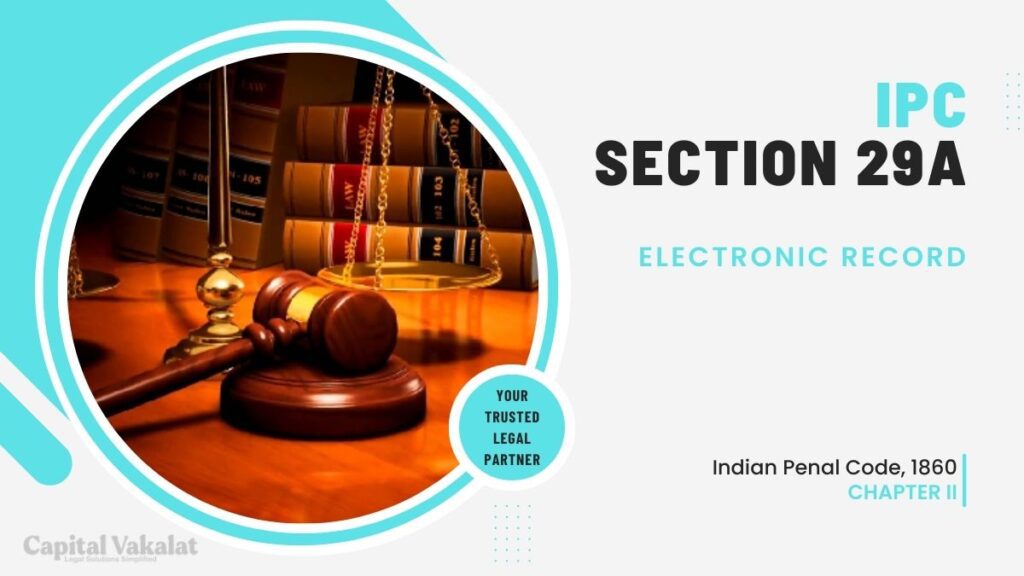In the fast-paced digital age, the legal landscape has undergone a significant transformation with the emergence of electronic records. Section 29A of the Indian Penal Code (IPC) addresses the intricate realm of electronic records, bringing into focus the legal implications and nuances of these virtual documents. This article delves into the depths of Section 29A IPC, unraveling its implications and shedding light on the ever-evolving world of electronic records.

As our world becomes increasingly digital, the importance of understanding the legal implications of electronic records cannot be overstated. Section 29A IPC, introduced to address this digital shift, aims to provide a comprehensive framework for dealing with electronic evidence, ensuring fairness, accuracy, and the protection of individuals’ rights.
Understanding Electronic Records
What Constitutes an Electronic Record?
An electronic record encompasses a wide range of digital documents, including emails, text messages, spreadsheets, images, and more. Essentially, any information stored or transmitted electronically falls under this category.
Legal Recognition of Electronic Records
In today’s interconnected world, electronic records are granted legal recognition, subject to certain conditions. They are admissible as evidence in court proceedings under the Indian Evidence Act, 1872, provided their authenticity and integrity can be established.
Exploring Section 29A IPC
Background and Inclusion
Section 29A was inserted into the IPC to address the challenges posed by the digitalization of records. It acknowledges the validity of electronic records and outlines the offenses related to their manipulation and unauthorized access.
Intent and Scope
The intent behind Section 29A is to prevent the misuse of electronic records and ensure their credibility. It serves as a deterrent against tampering, hacking, and other forms of digital malpractice.
Offenses Relating to Electronic Records
Tampering with Electronic Evidence
Section 29A criminalizes the tampering or alteration of electronic evidence with the intention to deceive or manipulate legal proceedings.
Unauthorized Access to Electronic Records
Gaining unauthorized access to electronic records, such as hacking into systems or stealing sensitive data, constitutes a punishable offense under this section.
Challenges and Concerns
Data Security and Privacy
The digital era introduces concerns about data security and privacy breaches. Protecting electronic records from unauthorized access and ensuring their confidentiality is a pressing challenge.
Digital Signature Authenticity
Verifying the authenticity of digital signatures attached to electronic records is a critical concern. Ensuring that signatures cannot be forged is essential for maintaining trust in electronic transactions.
Admissibility of Electronic Records
Hurdles in Admissibility
Admitting electronic records as evidence faces challenges due to the potential for manipulation and tampering. Ensuring their reliability and integrity is a central concern.
Conditions for Admissibility
For electronic records to be admissible, they must satisfy conditions like being generated in the ordinary course of business, stored securely, and accessible for examination as and when required.
Comparative Analysis
Electronic Records vs. Traditional Documents
Comparing electronic records with traditional documents underscores the efficiency, accessibility, and vulnerability of digital data. While electronic records offer convenience, they also demand stringent security measures.
Legal Safeguards
Electronic Signature Laws
Electronic signature laws provide a legal framework for validating digital signatures, ensuring their authenticity and integrity.
Encryption and Data Protection
Encryption plays a pivotal role in safeguarding electronic records. Robust encryption techniques enhance data protection and prevent unauthorized access.
Ensuring Compliance
Role of Organizations
Businesses and organizations must adhere to data protection regulations and establish robust practices for electronic record management to ensure compliance with the law.
Best Practices for Recordkeeping
Implementing best practices for electronic record management involves regular backups, encryption, access controls, and employee training.
Future Outlook
Technological Advancements
As technology evolves, so do the challenges and opportunities in managing electronic records. Advanced encryption and authentication methods will play a pivotal role in shaping the future landscape.
Legal Reforms and Adaptations
The legal framework will likely continue to evolve to address emerging issues in electronic record management. Adapting laws to technological advancements will be crucial.
Conclusion
Section 29A IPC stands as a sentinel in the digital age, safeguarding the sanctity of electronic records. Its provisions not only deter malicious activities but also promote the responsible and secure use of electronic evidence.
here are some external resources for further details on the topic of Section 29A IPC and electronic records:
- “Understanding Section 29A IPC: A Comprehensive Guide“ This guide provides an in-depth analysis of Section 29A IPC, its implications, and practical insights into electronic record-related offenses.
- “Admissibility of Electronic Records in Indian Courts“ Learn about the challenges and conditions for admitting electronic records as evidence in Indian courts, backed by legal experts’ opinions.
Feel free to explore these resources to deepen your understanding of the topic and stay up-to-date with the latest developments in the realm of electronic records and Section 29A IPC.
FAQs
How do electronic records differ from physical documents?
Electronic records are digital documents stored or transmitted electronically, while physical documents exist in tangible forms like paper.
Can electronic records be used as evidence in court?
Yes, electronic records can be used as evidence in court if their authenticity and integrity can be established.
What challenges do electronic records pose to data security?
Electronic records pose challenges related to data security, including unauthorized access, hacking, and data breaches.
How can businesses ensure the authenticity of electronic signatures?
Businesses can ensure electronic signature authenticity through robust verification methods and compliance with electronic signature laws.